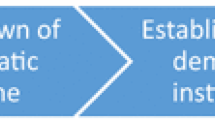Abstract
This chapter compares the democratisation trajectories of two of the oldest and most venerable of the world’s ‘really existing’ democracies—Canada and the United States. It adopts a long run ‘Comparative Political Development’ perspective which places twenty-first-century variations within a broad and configurative context. These two large federal regimes of recent settlement have many crucial structural and cultural features in common, and both belong clearly within the established democracy subset of countries. Yet they also display some very significant contrasts—presidential versus parliamentary; inflected by the legacy of slavery versus anglophone ascendancy over francophones; and much more. The chapter provides a critical re-reading and updating of Lipset, Continental Divide: The Values and Institutions of the United States and Canada, Routledge, 1990 study of these matters and traces the diverging trends of democratic slippage in the USA versus deepening in Canada. Notwithstanding these divergences, it resists the tendency to over-dramatise recent events, or to extrapolate them too far. Both cases belong within the overall TRU framework.
Access this chapter
Tax calculation will be finalised at checkout
Purchases are for personal use only
Similar content being viewed by others
References
Anderson, C. (2018). One person, no vote: How voter suppression is destroying our democracy. Bloomsbury.
Bateman, D. A. (2018). Disenfranchising democracy: Constructing the electorate in the United States, the United Kingdom, and France. Cambridge University Press.
Coppedge, M., Gerring, J., Teorell, J., et al. (2020). Varieties of democracy: Measuring two centuries of political change. Cambridge University Press.
Dahl, R. A. (2002). How democratic is the American constitution? (2nd ed.). Yale University Press.
De Tocqueville, A. (1945). Democracy in America (Vol. II). Vintage.
Evans, R. J. (2021). Demons of the present. The New Statesman.
Foner, E. (1998). The story of American freedom. W.W. Norton.
Frymer, P. (2014). A rush, and a push, and the land is ours: Territorial expansion, land policy, and U.S. state formation. Perspectives on Politics, 12(1), 119–144.
Greer, A. (2012). Commons and enclosure in the colonisation of North America. American Historical Review, 117(2), 365–386.
Hartz, L. (1955). The liberal tradition in America. Harcourt Brace.
Hofstadter, R. (1965). The paranoid style in American politics. Alfred A. Knopf.
Huntington, S. P. (2004). Who are we? The challenge to America’s national identity. Simon and Schuster.
Inglehart, R. F. (2018). Cultural evolution: People’s motivations are changing, and reshaping the world. Cambridge University Press.
Inglehart, R. F. (2020). Giving up on God: The global decline of religion. Foreign affairs. www.foreignaffairs.com/articles/world/2020-08-11/religion-giving-god (Last accessed 18 January 2021).
King, D. (1995). Separate and unequal: Black Americans and the U.S. federal government. Oxford University Press.
King, D. (2000). Making Americans: Immigration, race, and the origins of the diverse democracy. Harvard University Press.
King, D. (2011). Still a house divided: Race and politics in Obama’s America. Princeton University Press.
King, D., Lieberman, R. C., Ritter, G., & Whitehead, L. (2009). Democratisation in America: A comparative-historical analysis. Johns Hopkins University Press.
Lacroix, J.-M. (2016). Histoire du Canada: Des Origines a Nos Jours. Tallandier.
Levistky, S., & Ziblatt, D. (2018). How democracies die. Viking.
Lipset, S. M. (1971). Agrarian socialism (2nd ed.). University of California Press.
Lipset, S. M. (1979). The first new nation: The United States in historical and comparative perspective. W.W. Norton.
Lipset, S. M. (1990). Continental divide: The values and institutions of the United States and Canada. Routledge.
Lipset, S. M., & Marks, G. (2000). It didn’t happen here. W.W. Norton & Company.
McRoberts, K., & Monahan, P. (1993). The Charlottetown accord, the referendum, and the future of Canada. University of Toronto Press.
Norris, P., Cameron, S., & Wynter, T. (2019). Electoral integrity in America: Securing democracy. Oxford University Press.
Page, B. I., & Gilens, M. (2017). Democracy in America: What has gone wrong and what we can do about it. Chicago University Press.
Pierson, P., & Schickler, E. (2020, May). Madison’s constitution under stress: A developmental analysis of political polarization. Annual Review of Political Science, 23.
Preston, A., & Rossinow, D. (2017). Outside in: The transnational circuitry of American history. Oxford University Press.
Przeworski, A. (2019). Crises of democracy. Cambridge University Press.
Runciman, D. (2018). How democracy ends. Profile.
Saunt, C. (2020). Unworthy republic: The dispossession of native Americans. WW Norton & Company.
Schor, P. (2017). Counting Americans: How the U.S. census classified the nation. Oxford University Press.
Shafer, B. (1991). Is America different? A new look at American exceptionalism. Oxford University Press.
Sunstein, C. (2018). Can it happen here? Authoritarianism in America. Harper Collins.
Thomas, D. M. (2000). Canada and the United States: Differences that count. Broadview Press.
Weinberg, A. K. (1935). Manifest destiny: A study of nationalist expansion in American history. Johns Hopkins University Press.
Whitehead, L. (2022). Political polarization: A conceptual survey. Taiwan Journal of Democracy, 18(1).
Author information
Authors and Affiliations
Corresponding author
Editor information
Editors and Affiliations
Rights and permissions
Copyright information
© 2022 The Author(s), under exclusive license to Springer Nature Switzerland AG
About this chapter
Cite this chapter
Whitehead, L. (2022). United States–Canada: The Two Overlapping Democratic Trajectories in North America. In: van Beek, U. (eds) Democracy under Pressure. Challenges to Democracy in the 21st Century. Palgrave Macmillan, Cham. https://doi.org/10.1007/978-3-031-09123-0_7
Download citation
DOI: https://doi.org/10.1007/978-3-031-09123-0_7
Published:
Publisher Name: Palgrave Macmillan, Cham
Print ISBN: 978-3-031-09122-3
Online ISBN: 978-3-031-09123-0
eBook Packages: Political Science and International StudiesPolitical Science and International Studies (R0)




